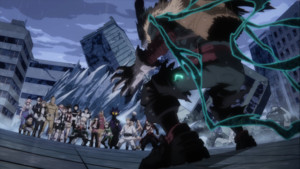
[ad_1]

Dear readers, I feel like we know each other fairly well by this point. So I ask that, for just a moment, you indulge me in dredging up some tired old superhero comics discourse. I promise I have a point.
If you’re at all into western cape comics, or even just follow their ancillary media, you’ve probably heard the never-ending argument about what Superman should be in the modern age. Some people think he should be grim and grounded, forced to reckon with his alien origins that forever separate him from the rest of the world, and forced to compromise the character’s Golden Age ideals to be relatable to a more jaded audience. Others prefer something closer to his original incarnation, a positive and altruistic beacon of the heroic ideals we so often want to see in the world, acting as a role model. Personally, the stories that have made me like Supes the most were the ones that played with that tension; where Superman is a genuinely admirable and optimistic person, and his constant heroism is his attempt to keep that optimism alive in the face of a chaotic and often cruel reality. There’s just a compelling drama to somebody with sincere compassion, struggling to make the world even a tiny bit better, yet always feeling like they could do more. Superman is incredibly powerful, and capable of doing more good than just about any other person on the planet, but even he can’t fix the world’s ills single-handedly, and that can eat at him something fierce.
Suffice it to say, I am eating all this Cryptid Deku drama up like hungry little goblin, in part because it’s just as indulgent as my previous paragraph. Kōhei Horikoshi has a clear and abiding love for western superhero comics, especially Spider-man, but he’s only rarely gotten to dig into the 90’s “Dark” era of his main inspirations. Deku just isn’t a character who can believably be the gravel-throated badass who contemplates life and death while brutalizing his villains or giving gritty monologues in the dead of night. Now, he doesn’t have to be. Instead his dark side manifests as a worn down, ragged, unceasing force that is so consumed by his sense of personal responsibility that he stops seeming human. That’s how MHA can justify its hero stalking through the streets, looking to all the world like a terrifying villain with unknowable powers, who strikes terror in strangers even as he tries to help them. It’s grimdark 90’s ultracheese, but with the character writing to back it up.
Though really, this is something just about everyone who knows Deku could have seen coming. His defining trait from day one has been self-sacrifice. When he sees somebody in danger, no matter the circumstance, his first and only instinct is to throw his nerdy little body into the fire. He spent the first half of this show continually shattering his own bones to that end, and becoming more competent and powerful has only served to fan those flames. With his arsenal of Quirks and the threat of the world’s greatest villain bearing down on him, he’s finally gotten the power and agency to grind himself to the bone with nobody to stop him.
Certainly All Might can’t, seeing as he did the exact same thing his entire life. He gave everything he could for decades, even when his body was failing and his powers were mere shadows of his prime, and only retired when it became physically impossible to keep going. It’s only now, as he’s forced to spectate his own protege’s slow self-destruction, that he really understands how hard that must have been on the people closest to him. In many ways, All Might has been the perfect mentor for Deku, but here and now, even he knows he can’t tell the kid what he desperately needs to hear. He spent his whole life being the indomitable Symbol of Peace, and it’s left him without the strength to hold his successor back from repeating his mistakes. Fact is, nobody can be All Might, not even All Might, and Deku is liable to ruin himself before he figures that out.
That makes for a very heavy, even heartbreaking first half of this episode, but there’s thankfully a light on the other end of it. The secret is that, while All Might picked Deku as his successor, his legacy is far, far wider than passing on One For All. There’s an entire generation out there who have taken his heroism to heart, and quite a few of them recognize the vicious spiral at play. I love how Bakugo is the one to say it first – he knows how his rival and mentor tick, and has enough distance to realize how their worst habits could form a death spiral.
However, it’s the entirety of Class 1-A who choose to act, arriving to stop their friend from destroying himself, and it sets up for another gleefully indulgent story beat next week. Every shonen battle series loves the chance to have comrades fight each other, to drown in the drama of friends having to cross swords and exchange blows despite how much they care for each other. MHA has thankfully done a great job in building to that moment, letting the confrontation arise organically from the characters’ personalities and choices. There’s no brainwashing or hidden secrets; only a kid willing to sacrifice himself for the sake of the world, and the friends who want to pull him back from that brink.
Rating:
My Hero Academia is currently streaming on
Crunchyroll.
[ad_2]





